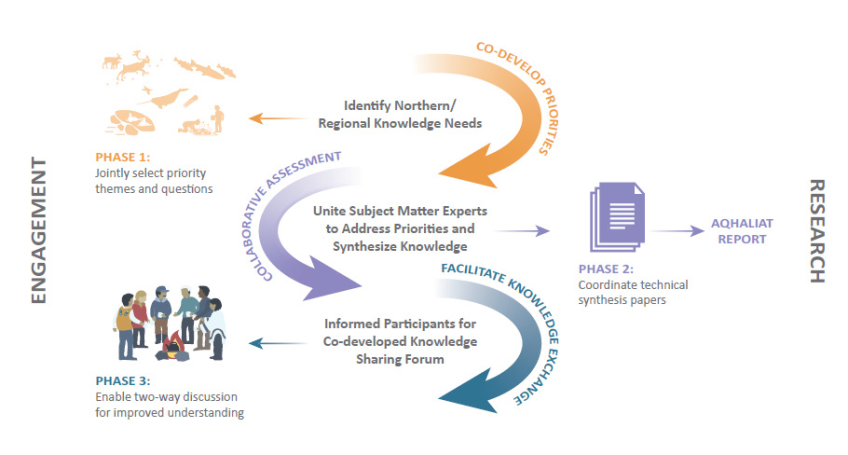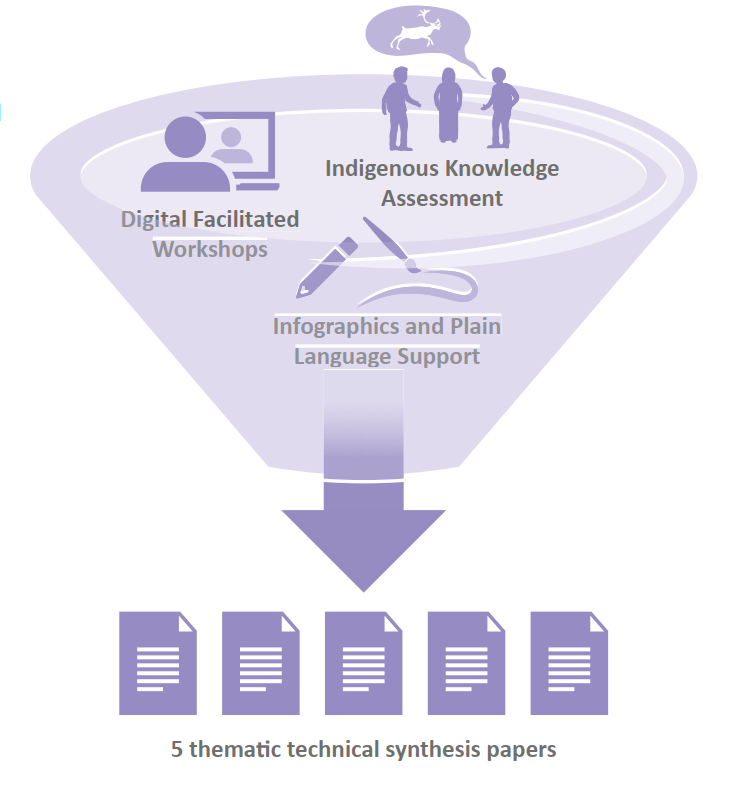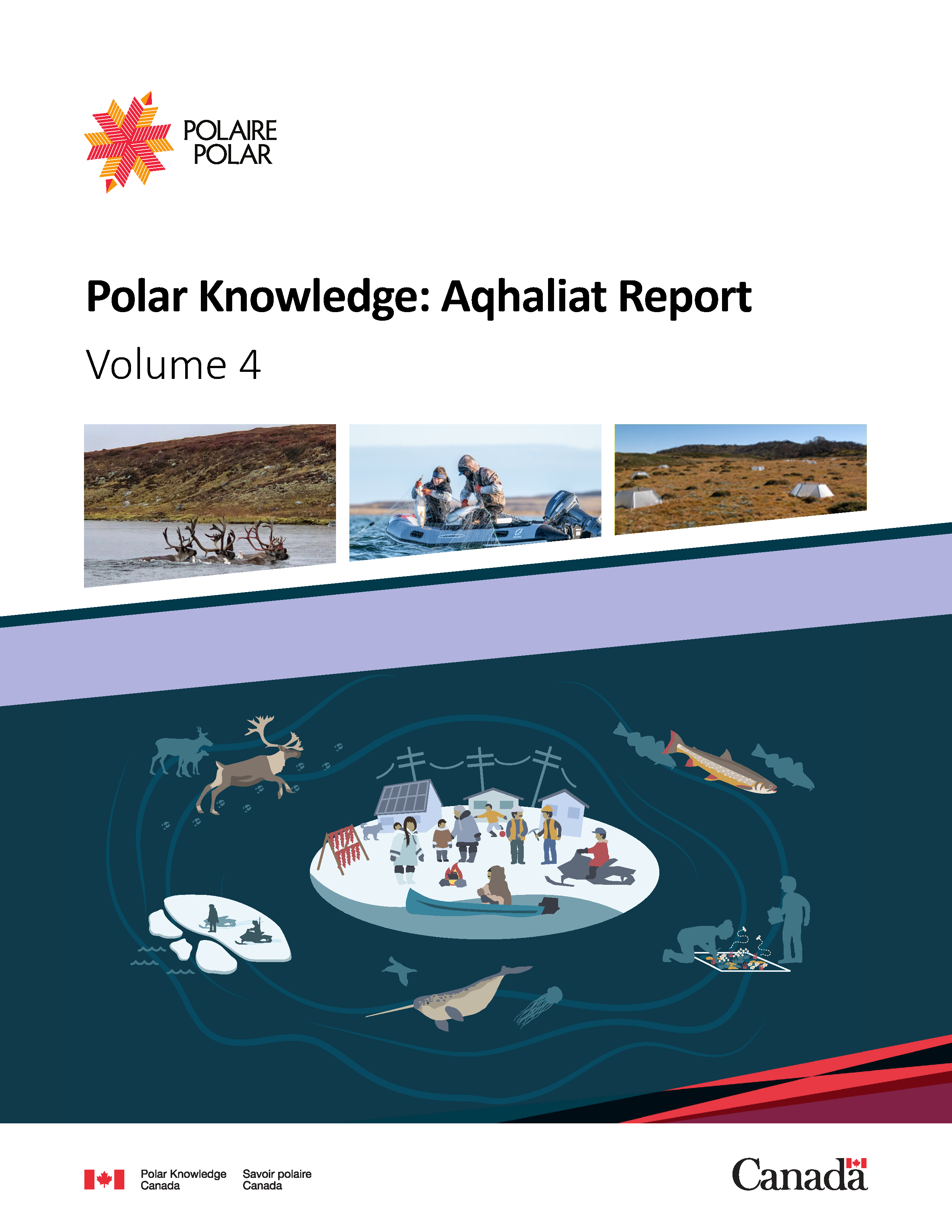Polar Knowledge: Aqhaliat Report - volume 4
Message from the Chief Scientist, David Hik

I am excited to share this special edition of the Polar Knowledge Aqhaliat Report, featuring diverse content that highlights some of the latest scientific results and knowledge mobilization programming supported by Polar Knowledge Canada. This unique edition focuses on 5 themes, co-developed with community partners in the North. Technical papers were written by multi-author teams via a collaborative assessment process that we describe in the overview section. Authors have worked across disciplinary boundaries to summarize current research and design beautiful infographics. We have also introduced a new infosheet section that provides summaries of individual projects at-a-glance. The technical papers and infosheets are presented together in a visually appealing new format we hope sparks discussion and fuels improved understanding. We look forward to hearing your thoughts about Aqhaliat volume 4!
Table of contents
- Methods of the collaborative assessment
- Environmental change in the Kitikmeot Region of western Nunavut and Ulukhaktok region of eastern Northwest Territories
- Arctic char in a rapidly changing North
- Marine mammals in a changing Arctic Ocean
- Caribou – heartbeat of the tundra
- Understanding the effects of climate change on food security in northern Indigenous communities
- Infosheets
- Infographics of the collaborative assessment
Methods of the collaborative assessment
Polar Knowledge Canada (POLAR) is mandated to strengthen Canada's leadership on Arctic issues and advance knowledge of the Canadian Arctic. Through leadership, partnerships and collaboration on polar science and technology, one of the federal agency's major functions is to create and synthesize knowledge and share information for decision making, for the benefit of northern communities and all Canadians. In March 2020, POLAR hosted a Regional Planning and Knowledge Sharing Workshop at the Canadian High Arctic Research Station (CHARS) campus in Cambridge Bay, Nunavut, Canada. The workshop focused on perspectives of Indigenous knowledge holders, knowledge producers and knowledge users in Nunavut and the Northwest Territories to identify key thematic sessions of relevance to communities, while establishing guidelines for communicating and sharing knowledge within a northern context.
Over its first five years of operation (2015–2019), POLAR-led and POLAR-supported research has encompassed a broad range of topics, including: climate change, ecosystems and biodiversity monitoring, physical sciences research, community-led wildlife research and monitoring, Inuit Qaujimajatuqangit, changing sea ice, permafrost and snow conditions monitoring as well as improving northern-built infrastructure, alternate and renewable energy and applied technologies. While many topics are important to Northerners, POLAR invited the Indigenous delegates and other partners to identify five key topics that could serve as meaningful session themes for an eventual knowledge sharing forum. After meaningful discussion, the 2020 workshop participants selected five themes of highest relevance:
- Caribou population abundance and migration;
- Arctic char and other fish population dynamics;
- Whale populations and marine ecosystem biodiversity;
- Climate change research and monitoring;
- Environmental change – snow, ice, precipitation.

Engagement and research
Phase 1: Co-develop priorities. Identify Northern/Regional knowledge needs. Jointly select priority themes and questions.
Phase 2: Collaborative assessment. Unite subject matter experts to address priorities and synthesis knowledge. Coordinate technical synthesis papers. Aqhaliat report.
Phase 3: Facilitate knowledge exchange. Informed participants for co-developed knowledge sharing forum. Enable two-way discussion for improved understanding.
To further refine themes, each participant was invited to write down a key question of relevance. Over 40 questions were compiled as part of the co-development and engagement process. These form the basis of POLAR's collaborative assessment project. The Collaborative Assessment project united experts to address these questions and synthesize knowledge on these priority themes for a northern audience. This was done by coordinating diverse subject-matter experts, including Indigenous Knowledge holders, to discuss research and monitoring results, interpret trends, identify key areas for further research, and organize information to address policy relevant issues in comprehensive manner through the production of five technical synthesis reports. Co-authorship working groups were formed for each identified theme, drawing upon the expertise of approximately 70 researchers, wildlife managers and analysts from across Canada. An external digital facilitator was hired to lead workshops and help working groups cater subject content. Working groups met via a set of virtual workshops during summer of 2021, designed to enable cross-disciplinary discussion and collaboration towards the production of expert driven, northern–tailored synthesis papers. To facilitate knowledge exchange, each synthesis report was edited for plain language, augmented with infographics for visual learners. Working group were given flexibility to develop a unique path forward to address their specific theme, associated questions, and relay pertinent information critical to northern decision-making, resulting in variety in the presentation the final 5 papers published in this Aqhaliat Report.
The collaborative assessment ran parallel to an Indigenous Knowledge (IK) assessment. This assessment ensured that Indigenous Knowledge holders were provided the full opportunity to participate in sharing knowledge on the five themes and that IK will be represented in final technical paper submission. This was facilitated by Ajungi Arctic Consulting Group. Despite the short timeframe to recruit, a good selection from across the North, of different ages, genders and professions participated and shared their knowledge in the workshops. Two members of each working group were able to observe the workshop and given an opportunity at the end of the session to ask questions for clarification or additional information. Summary reports were developed from the workshops and sent to IK assessment participants to review for accuracy. These summaries were integrated into each thematic report into an Indigenous Knowledge section. The workshops were deemed a success by those who participated.

Indigenous knowledge assessment, digital facilitated workshops, and infographics and plain language support are used for the 5 thematic technical synthesis papers.
Download the report
Polar Knowledge Canada
For media inquiries, contact:
communications@polar-polaire.gc.ca
Page details
- Date modified:
